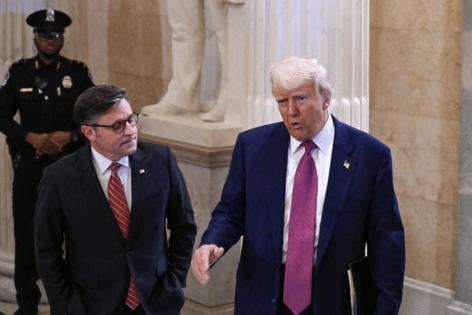US House Republicans stop time -- again -- to avoid votes on Trump's tariffs
Published in Political News
WASHINGTON — Instead of voting on President Donald Trump’s sweeping tariffs, U.S. House Republicans resorted this week to another arcane rules maneuver — all to prevent what could be politically uncomfortable votes for GOP lawmakers.
But in the process of basically putting the calendar on hold, we saw the first cracks in GOP support for those Trump import duties.
Under federal law, once a president declares an emergency and institutes tariffs, Congress can quickly force repeal votes, with action required in 15 days.
But what happens if the calendar never moves? That’s the rules trick that House Republicans used again this week — freezing the calendar into 2026 so that tariff votes are never triggered.
“Congress should be voting on these tariffs,” protested Democrats, including U.S. Rep. Jim McGovern, D-Mass.
For the first time, we saw some evidence of GOP concern about the lack of congressional action on tariffs. Six House Republicans refused to vote for the latest calendar change, forcing House Speaker Mike Johnson to set a new deadline of Jan. 31, 2026 — two months earlier than his original plan.
The move came as Democrats have stepped up their criticism of the Trump tariffs, bolstered by recent price increases for some consumer staples, such as coffee.
“The Trump tariffs are driving job losses,” said U.S. Rep. Hank Johnson, D-Lithonia.
Despite concerns about the economic impact of tariffs, most Republicans seem willing to stick with Trump, hoping that the ultimate end game involves numerous trade deals which reduce barriers to American farmers and goods.
“I don’t like the tariffs,” said U.S. Rep. Austin Scott, R-Tifton, who has made clear his concern for months. But in the same breath, Scott and other GOP lawmakers argue that Trump deserves the chance to produce new trade deals.
“Politics is a team sport and when you want to get things done, you got to work together,” Scott said.
That’s where farmers are right now as well. Georgia farmer Zippy Duvall, who leads the American Farm Bureau Federation, sent that same message in a meeting this summer with Trump.
“I told him we didn’t support his tariffs because they hurt us, but that we sure hope his direction is successful,” said Duvall, who argues U.S. farmers need more foreign markets opened to American products.
One perfect example is China, which used to buy huge amounts of American soybeans. But those purchases ended after a trade war started this year with Beijing.
How long does that GOP goodwill hold up in Congress and out on the farm?
Next year is an election year. No matter what Congress does on tariffs, the voters may get the final say.
---------------
©2025 The Atlanta Journal-Constitution. Visit at ajc.com. Distributed by Tribune Content Agency, LLC.
























































Comments